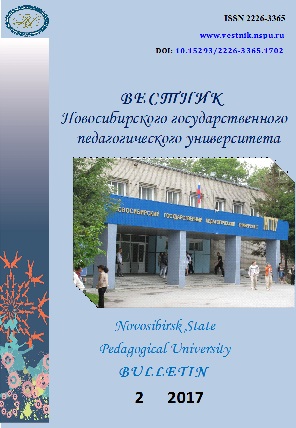Творческая самореализация учащихся в процессе изучения русского языка как иностранного
Pupils’ creative self-realization in the process of learning Russian as a foreign language
Author(s): Zinaida Nikolaevna Nikitenko, Vladislav Dmitrievich Yanchenko, Ekaterina Andreevna Nikitenko, Alevtina Dmitrievna DeykinaSubject(s): Language studies, Foreign languages learning, Philology
Published by: Новосибирский государственный педагогический университет
Keywords: Russian as foreign language; self-realization; cognitive development; communication; speech creativity; foreign language ability; regularities; developing technology; Russian as heritage language
Summary/Abstract: Introduction. The article raises the problem of creative self-realization of students in mastering Russian as a foreign language. The aim is to elicit the conditions for creative self-realization, including speech creation, as well as to prove the statement that the formation of communicative competence of the individual should go hand in hand with the development of his/her creative and cognitive potential, in order to provide the axiological component of the Russian language as a culture-forming educational discipline. Materials and Methods. In order to solve this problem the authors use the methodology of the activity approach, according to which personal development takes place in activities, which are of developing character and are developing themselves. In this regard, the authors stress the methodological importance of creative speech exercises in writing and speaking, contributing to the development of pupils' coherent speech and creative attitude to language. Special attention is paid to the conditions for creative self-realization of young learners taking into account the peculiarities of mastering Russian in the primary school. Results. At the early school age self-realization correlates with speech creativity, which is determined by the cognitive sphere. The latter develops when children master the language not on the basis on imitation, but via development of language and speech abilities. These abilities allow pupils to "create" their speech nearly the same as they do in their native language without repeating phrases after the teacher or reproducing memorized texts. In order to develop these abilities in children, a teacher must first take into account psy-cholinguistic laws, which are interpreted in the article as a set of methodical regularities of learning a new language in primary school age. A special role in providing conditions for crea-tive self-realization of young learners is given to the introductory oral communication period, which aims at fostering equal opportunities for all children. The article identifies the distinguished features of this period. The organization of the Russian language oral communication period focuses on the interconnected development of speaking and listening skills through the development of phonological ability; the process of acquiring language devices and techniques has problem-based and creative character; reflexive-evaluative language acquisition and as well as reflexive observation of manifestations of Russian culture in comparison with the facts of the native culture. In order to develop pupils’ creative skills of learning language as a means of communication, it is important to use experimentally proved technology which ensures acquisition of language devices in the context of game activities along with game motivation of oral communication and non-verbal and educational actions of young learners. The technology also ensures the mastery of foreign language reading and writing based on communicative core and phonological abilities which contribute to spelling competence of pupils and the development of good handwriting; acquisition of communicative competence through communication; the acquisition of personal qualities and values; the formation of reflexive self-evaluation skills. The article also discusses the new status of the Russian language as a heritage language for the bilingual children of our compatriots abroad. The authors reinforce their view by historical insight into the culture of bilingualism. The result of the undertaken research is a complex of identified conditions, contributing to the realization of students’ creative independence. Conclusions. The conclusion of the article stresses the significance of the conceptual approach established by the authors for developing students' abilities favorable for their creative independence in the process of learning Russian as a foreign language.
Journal: Вестник Новосибирского государственного педагогического университета
- Issue Year: 7/2017
- Issue No: 2
- Page Range: 7-19
- Page Count: 13
- Language: Russian

